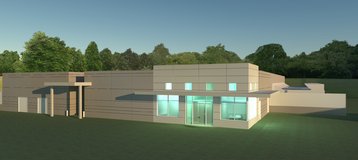Michigan State University is set to build a $46 million data center to help consolidate legacy infrastructure and deliver modern IT resources to its students, with the Board of Trustees approving the budget last week.
The new facility will replace two existing data centers that are located in the flood plain, including the Main Administrative Computing Data Center. The upcoming building will host both general purpose servers, as well as the High Performance Computing (HPC) equipment.
The data center will initially support 2.5MW of IT load, with a target PUE of 1.3.
According to the State News, the construction of the project will be managed by Holder Construction based in Georgia; however the majority of the money will be spent in Michigan.
Out with the old
There are currently around 70 data centers spread across the MSU campus, but the university has been considering a new, larger facility since 2010.
One of the reasons is the lack of space to run demanding HPC workloads: the existing high performance computing center is at full capacity, and not able to support further growth of research projects, limiting the university’s ability to attract large federal grants.
MSU has decided to build its latest data center on Crescent Road, on the southwest side campus, with the construction work scheduled to begin this month. The 25,000 square feet building will offer 10,600 square feet of server space, initially hosting about 300 server racks.
The new facility will start with 2.5MW pf power, but this can be increased further, with the utility infrastructure built to support up to 10MW worth of equipment.
The university plans to spend $36.5 million on construction, $5.5 million on utility extension and $4 million on project contingency.
A new data center will enable the University to shut down one of the legacy sites, and convert another into a disaster recovery facility.
The project is part of the MSU’s IT Transformation Initiative, which aims to strengthen core IT services, aligning IT across campus and foster technological innovation for university’s programs, research, and education.
Most of the work on the site is expected to finish by February 2018.

